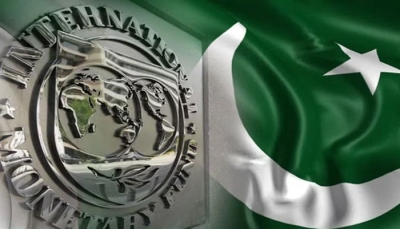Washington: Cash-strapped Pakistan would need two or three years to implement structural reforms prescribed by the IMF, Finance Minister Muhammad Aurangzeb has said, warning that the country would be looking for another bailout programme if it fails to go through these measures.
Speaking at the Atlantic Council think tank in Washington, Aurangzeb said that Pakistan doesn’t need too many policy prescriptions; it just needs to implement those policies, Geo News reported.
The finance minister is currently in the US to attend the spring meetings of the World Bank Group and discuss a new loan package with the International Monetary Fund (IMF).
Responding to a question, Aurangzeb said that Pakistan was looking for a larger and longer programme from the IMF because “we need two to three years for structural reforms.”
He forewarned that if Pakistan — which has entered 24 programmes with the IMF — doesn’t go through the structural reforms, the country would still be looking for another programme, the report said.
“We have known the what and why not for years but for decades,” he was quoted as saying in the report.
“It’s time for us to actually start moving the execution of these aspects, and why we’re looking for a larger and extended programme, so once we get into the execution, we will need a two to three-year time period to go through the structural reforms,” he said.
Responding to how Pakistan could successfully rebuild its economy, Aurangzeb said, “We do not need too many policy prescriptions. We know what to do … it’s time for us to start moving”.
He said that the country needed “timely decisions, timely execution” to build its economy as “no strategy works without execution.”
Aurangzeb also stressed the need for promoting financial inclusiveness and climate resilience when asked to comment on the ongoing debate about reforming the Bretton Woods twins — the IMF and the World Bank.
“We are dealing with adaptation and financing and to the extent that these institutions come in to help countries like Pakistan from inclusive growth perspective and climate change perspective. Our interests are going to be very well aligned,” he said.
Asserting that Pakistan needs to go end-to-end digitalisation of the tax authority to minimise human intervention, he said, “It’s not just about revenue, it’s about transparency and client experience, which is going to bring trust and confidence back into the tax authority.”
He added that Pakistan needs to move towards public-private partnerships at the federal and provincial levels.
In mid-March, IMF’s global team reached a staff-level agreement with the Pakistani authorities on the second and final review of Pakistan’s stabilisation programme supported by the global lender’s $3 billion standby arrangement approved in July last year.
Earlier this month, the World Bank’s biannual Pakistan Development Outlook report painted a grim economic picture, indicating that the country is set to miss almost all major macroeconomic targets, cautioning that over 10 million more people are at risk of descending into poverty.
The Washington-based lender’s apprehension came from a sluggish economic growth rate of 1.8 per cent, coupled with soaring inflation, a staggering 26 per cent in the current fiscal year.
PTI
